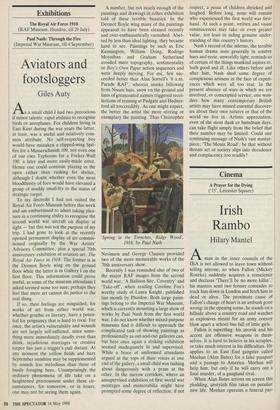Cinema
Irish Rambo
Hilary Mantel
Aman in the inner councils of the IRA is not allowed to leave town without telling anyone; so when Fallon (Mickey Rourke) suddenly acquires a conscience and declares 'There'll be no more killin',' his masters send two former comrades to track him down in London and fetch him in dead or alive. The proximate cause of Fallon's change of heart is an ambush gone wrong: in the opening scene, he stands on a hillside above a country road and watches as explosives meant for an army convoy blow apart a school bus full of little girls.
Fallon is superthug: his anorak and his accent are offensive weapons in them- selves. It is hard to believe in his scruples, or take much interest in his difficulties. He applies to an East End gangster called Meehan (Alan Bates) for a false passport and a passage to America. Meehan will help him, but only if he will carry out a final murder, of a gangland rival.
When Alan Bates arrives on screen this plodding, unstylish film takes on peculiar new life. Meehan operates a funeral par- lour as a cover; he takes pride in a nicely turned-out corpse, and gives discounts to old ladies. After a scene with one such doddering pensioner, whose name is Mrs Orton, it becomes impossible to believe that the film has any serious intention: one waits for the next bit of black humour, the next bit of high camp. After all, there is nothing else that we haven't seen before. The script is leaden, the acting wooden; the camerawork tries and fails to generate excitement, and the score can only be described as naff.
Fallon shoots the gangster, and the killing is witnessed by a priest (Bob Hos- kins). When Meehan finds this out, he wants Father Da Costa killed, but Fallon has a better idea. He tells his tale in the confessional. The priest is not then able to reveal his identity to the police. (The 'seal of the confessional' is such a weary old plot device that one would imagine that any priest who witnessed a crime would stay out of the box and get a locum in.) Beset as he is by the law on the one hand and his IRA chums on the other, Fallon still finds time to listen to the priest's blind niece playing the church organ. Sammi Davies, as the niece, gets some of the worst of the lines, as though she had the added burden of simple-mindedness. She finally parts the tough guy from his anorak, and they go to bed together. Immediately afterwards, the camera takes a long look at Fallon walking downstairs with a particu- larly gingerly and pained gait. Perhaps, of course, he always walked like that, but it seems indelicate to choose this moment to linger over it.
Soon afterwards the plot loses all grip on reason. The philosophical confrontations between the priest and the terrorist are of no interest, because they are given only cardboard sentiments; and there are manu- factured panics, false climaxes, and finally, for the IRA man, a fatal fall from the church roof. As he plummets, a crucifix breaks his fall and almost saves him – but not quite. And – do you know – I think there's an allegory in that. If there were an annual award for cinematic crassness, the terrorist's last moments would be high amongst the nominations for 1988.
Who is responsible for this waste of time, talent and money? We know that Jack Higgins wrote the original novel, but after that it's hard to be sure. The produc- ers and the cast have been blaming the film's backer, Samuel Goldwyn; they say that the final cut has been so edited that it bears little resemblance to the film they undertook to make. Director Mike Hodges asked for his name to be taken off the credits, and Mickey Rourke complained that it has been turned into 'an Irish Rambo'.
Yet one can't help but feel that the version they had in mind might have been worse. Rourke has certain sympathies with the character he portrays, and – it is said spent a little time in Northern Ireland before filming began and developed an instant expertise in Republican affairs. He then insisted on the shooting of extra scenes, to establish his character's baCk- ground and beliefs and presumably to make us feel sorry for the man. It is true that the film has nothing to say about Ireland; but better to leave it like that than to load further pretension on to its totter- ing structure.
This film was chosen, for some reason, to open last year's London Film Festival; but it was withdrawn, after the Enniskillen massacre, as a gesture to good taste. The situation in Ireland is used by dramatists and thriller writers to provide people on this side of the water with light entertain- ment: Derry as Dodge City, the Divis flats as the OK Corral. Will the public stomach never be revolted? Probably not.







































































 Previous page
Previous page